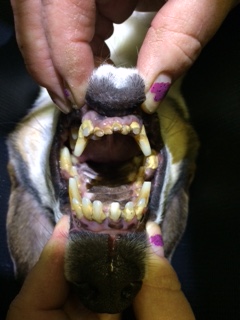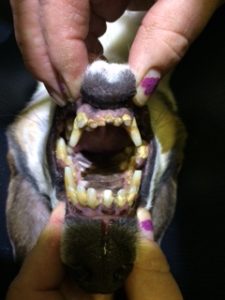
Why is it important to keep your pet’s teeth clean? Besides the obvious preference of having our pet’s breath smelling minty fresh, 80% of dogs and 70% of cats have dental disease by age 3. Those are pretty staggering statistics. Aside from saving your pet pain and discomfort, dental health is related to a chain of reactions that affect his or her overall health. It is a key part of your pet’s everyday health and vitality and as far as diseases go actually the most common clinical disease seen in dogs.
Where do we begin?
Dental disease begins when bacteria turns into plaque(a slimy film of bacteria) that sticks to the surface of the teeth. This causes bad breath to start. Minerals in the saliva harden the plaque into tartar (hard calcified deposits that form on teeth) which spreads under the gum line. Unlike plaque (that you can remove with home care), tartar must be removed by your Veterinarian in Richmond Hill. Bacteria under the gum line secrete toxins which contribute to tissue damage and gum inflammation. Gum disease may progress to cause pain and tooth loss.
This bacteria is considered a foreign invader by the immune system and it causes an immune response. The immune system reacts, inflammatory chemicals move in and these chemicals cause damage to the supporting tissues of the tooth. Instead of solving the problem, your pet’s own immune system makes the disease worse. The inflamed gums allow bacteria to enter the bloodstream and once in the bloodstream, bacteria travel throughout the body where they can negatively impact vital organs like the heart, liver and kidneys.
There are many factors that contribute to dental problems.
Age: Dental disease is more common in older pets.
Breed: Certain breeds will be more prone to dental disease for one reason or another. As an example the Veterinarians in Richmond Hill say Persians and other flat-faced cats that are more likely to have overcrowded or misaligned teeth that are difficult to keep clean will be more prone to dental disease. In dogs, those with a short nose, small dogs or flat faced dogs are more likely to require closer supervision to keep their mouth’s healthy.
Food: Some foods can increase your pet’s risk of dental disease, so ask your Veterinarian in Richmond Hill for a nutritional recommendation.
Lastly, lack of dental care may also be contributing to the development of your pet’s dental disease so it is important to brush your pet’s teeth before plaque can mineralize into tarter. Scheduling annual dental check-ups with your Veterinarians in Richmond Hill is the most efficient way ensure your pet’s mouth stays healthy. If your pet forms tartar quickly or has a history of dental problems, more frequent exams and cleanings may be advised.
If you found this blog informative, please share it with your friends on Facebook . Please call us (905)764-1144 for any questions or search for more articles on our website: www.bayviewsevenanimalhospital.ca
Sincerely,
Julia Lohasz
Practice Manager
Bayview Seven Animal Hospital
“Your healthy companion is our pride & joy” 
Bayview Seven Animal Hospital, a veterinary clinic located on Hwy.7, one block West of Yonge, serving all pets in Markham, Richmond Hill, Thornhill, Vaughan and North York since 1988. We are your family vets for dogs, cats, rabbits, pocket pets and birds.
Disclaimer: No part of this website constitutes medical advice. Readers are advised to consult with their veterinarian.

